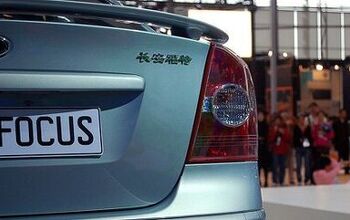Daily Podcast: Too Much, Too Little, Too Late
I believe that somebody is worth exactly what someone is willing to pay for them. If The New York Yankees are willing to pay shortstop Alex Rodriguez $275m for ten year's service, that's what he's worth. You can bet that owner George Steinbrenner stands to make more money than his employee. Well, that's the theory. In practice, sometimes the people signing the checks are so divorced from reality that they happily shell-out tens of millions of dollars to employees without any hope of recompense. Needless to say, I'm referring to the top level execs infesting GM, Ford and Chrysler. Now you could make a case that Ford is the exception– if we're talking about Alan Mulally. I reckon the former Boeing man might someday be worth Ford's $75m – $150m (at a guess) investment. As for Ford's million dollar plus top level suits– who've already proven that they don't know how to run a railroad– I'm not sure. I find Bill Ford's postponed payments even less convincing. The man owns stock. If Ford makes a profit, he will (once again) bank millions. Ford's compensation committee might think that it's worth $25m to $35m per year to get Bill Ford to "represent" the family biz and stay out of Alan Mulally's hair. I think not.
More by Robert Farago


































Comments
Join the conversation
R&D is everything, especially at this time in the auto business. If Toyota's CEO is making around 1 mil a year than I'm sure the rest of Toy's management is also at reasonable levels , which leaves a lot for my beloved R&D. Pity the fools that buy stock in the American big 2.......pity on me.
RF: From your own link, the footnote on Hiorshi Okudo's salary figure: In some cases...the CEO's pay is lumped together with that of the management board, meaning that we estimated the top guy's pay based on the aggregate figure. Oops. Sorry, but this is like saying Steve Jobs really only pulls down the $1 a year Apple officially pays him. Companies are bidding for executives in a competitive market, and as you point out, how are you or I any more qualified to estimate their value any better than the people doing the hiring, who have every incentive to save as much money as possible. I don't know much about the peculiarities of the Japanese market for executives, but I know that companies in Japan are notorious for basically guaranteeing lifetime employment once you make it to a certain seniority, and that high level executives are therefore extremely likely to come from within the company, leading to much less cross-firm competition.
NoneMore, There is a lot of logic in your point, but I am not so sure I go along with it anymore. For one thing, I am aware of CEO's who got there job primarily because it was believed or negotiated that they would put a lot of their own money into the company. Also, there are CEO's and other high chiefs that are selected because they are well connected with decision makers that may influence the company's success (such as government officials, executives at other companies, etc.) From one standpoint this is all fine. But I believe that too much of this has created a system where the top level folks have reached a position where they can wield too much power and are making it much harder for equally capable or effective people to get into the club. They then go about putting each other on boards to the point that it has become a bit incestuous. Think about all the really capable people you have known through school and business. Now think about how many of them are on a corporate board or are the officer of a major company. Don't count people you met AFTER they made it, only people you knew BEFORE they made it. Also, don't count people whose parents were in this club. I find people either knew many, or almost none. That tells me that there is a lot more than merit or luck involved. Just my theory. I can't prove it.